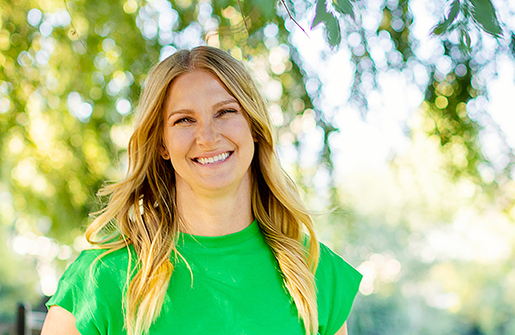
“The goal of Christian parenting is to give our kids space, time, and experiences that will help them get to know God. It is not to train children to obey.” An image bearing these words, styled in a sans serif font against a deep blue background, is pinned to the top of Meredith Miller’s (MDiv ’08) Instagram page. In the caption, Meredith expands on the idea: “Only if they know God can they decide God can be trusted. And only if they trust God can they respond to God in their choices and actions.”
Meredith’s Instagram page (@meredithannemiller) is a grid of resources on the topic of kids and faith. Scroll down, and you’ll find posts on “how to correct what your kid heard about God” or the ways “faith formation is not like eating broccoli.” Meredith’s posts are witty, concise, well-researched, and theologically rich. Her short bio reads, “You don’t need a seminary degree to talk with your kids about Jesus, but it’s nice to have a friend with one!”
A key thrust of Meredith’s work is to push against dominant old models of how we teach kids about faith—models that have proved ineffective and, at times, harmful. Instead, her focus is on helping kids know God. She’s the author of Woven: Nurturing a Faith Your Kid Doesn’t Have to Heal From, and she also produces a podcast called Ask Away, in which she and her sons talk through Bible stories together. Meredith laughs when she describes how these resources came about, because it all started when she wrote a few Instagram posts to offer her friends advice during the pandemic.
In March 2020, when lockdown began, many churches distributed Sunday school materials to families’ homes. Meredith says, “Kids’ curriculum was coming into my friends’ houses for the first time. They’ve always taken their kids to church, where something happens in the room, and you pick up your kid and ask, ‘What did you learn today?’ All of a sudden, the curriculum came home, and some of these resources felt jarring to my friends.”
She says, “They became aware that they needed to take a different role in their kids’ faith. The resources weren’t resonating. If anything, the materials made them a little concerned, and for good reason. A lot of the stuff that is available tends to be more moralistic than faith formational, and they hadn’t seen that before.”
But Meredith had. And this got her writing.

Jerome Blanco is editor in chief of FULLER magazine and FULLER studio.

Karley Carrillo is a creative content producer for Christian Assembly Church in Los Angeles and a freelance photographer. See more of her work at itsmekarley.com.
“The goal of Christian parenting is to give our kids space, time, and experiences that will help them get to know God. It is not to train children to obey.” An image bearing these words, styled in a sans serif font against a deep blue background, is pinned to the top of Meredith Miller’s (MDiv ’08) Instagram page. In the caption, Meredith expands on the idea: “Only if they know God can they decide God can be trusted. And only if they trust God can they respond to God in their choices and actions.”
Meredith’s Instagram page (@meredithannemiller) is a grid of resources on the topic of kids and faith. Scroll down, and you’ll find posts on “how to correct what your kid heard about God” or the ways “faith formation is not like eating broccoli.” Meredith’s posts are witty, concise, well-researched, and theologically rich. Her short bio reads, “You don’t need a seminary degree to talk with your kids about Jesus, but it’s nice to have a friend with one!”
A key thrust of Meredith’s work is to push against dominant old models of how we teach kids about faith—models that have proved ineffective and, at times, harmful. Instead, her focus is on helping kids know God. She’s the author of Woven: Nurturing a Faith Your Kid Doesn’t Have to Heal From, and she also produces a podcast called Ask Away, in which she and her sons talk through Bible stories together. Meredith laughs when she describes how these resources came about, because it all started when she wrote a few Instagram posts to offer her friends advice during the pandemic.
In March 2020, when lockdown began, many churches distributed Sunday school materials to families’ homes. Meredith says, “Kids’ curriculum was coming into my friends’ houses for the first time. They’ve always taken their kids to church, where something happens in the room, and you pick up your kid and ask, ‘What did you learn today?’ All of a sudden, the curriculum came home, and some of these resources felt jarring to my friends.”
She says, “They became aware that they needed to take a different role in their kids’ faith. The resources weren’t resonating. If anything, the materials made them a little concerned, and for good reason. A lot of the stuff that is available tends to be more moralistic than faith formational, and they hadn’t seen that before.”
But Meredith had. And this got her writing.
Jerome Blanco is editor in chief of FULLER magazine and FULLER studio.
Karley Carrillo is a creative content producer for Christian Assembly Church in Los Angeles and a freelance photographer. See more of her work at itsmekarley.com.


While she and her husband, Curtis (MDiv ’08), are lead pastors of a church plant, Meredith’s journey as a pastor has included decades in children’s ministry. (She taught her first Sunday school lesson to fourth and fifth graders when she was 16.) Over the years, Meredith came to learn that most children’s ministry resources are, problematically, steeped in moralistic therapeutic deism. In Woven, she explains that this framework teaches “religion is about being a good person . . . religion is meant to make me feel better . . . God is basically far away but might make an appearance now and then when I need help.”
Moralistic therapeutic deism focuses on instilling morality in kids—teaching them to be good, to be obedient, and the like. Bible stories become vessels to carry that message. Often, Meredith says, this involves looking at people in the Bible as good (or bad) examples of particular virtues. David was courageous; Eve was disobedient; Abraham was faithful; Thomas was filled with doubt. But reading the Bible this way, Meredith points out, introduces a few problems—like focusing on people instead of God.
She tells a story from her early years in children’s ministry: “A new curriculum company launched, and their framework was that every story exemplifies a virtue. But to read the Bible that way, you have to talk about the humans and whether they were or were not honest, or patient, or whatever. We started to realize we were sometimes shoehorning a virtue into a Bible story.” She said to herself then, “I care about what this story is actually trying to say. And this is not it.” Meredith says such a model misses the point: the Scriptures are meant to help us know God.
Meredith has worked as a children’s pastor in different churches, assisted with research at the Fuller Youth Institute, and helped design children’s curriculum at Willow Creek Community Church in Illinois. In all this, she’s worked with others to develop a better approach: reading age-appropriate Bible stories with kids and discovering alongside them what the Scriptures say about who God is. The idea is to invite children to play an active role in engaging with the Bible and in forming their relationships with God. Meredith says it’s easier than we might think. “Once you say ‘God is this way, what do you think of that?’ Every kid has an answer.”
When Meredith and her colleagues made this shift at Willow Creek, they discovered a dramatic change. Sometimes, when Meredith described God a certain way, kids wholeheartedly agreed: “Yes, one time God did this amazing wonderful thing!” “But,” Meredith says, “It was also the first time a kid could say, ‘That doesn’t feel true, because . . .’ And then they shared more of their own story.” Kids began to offer Meredith glimpses into what they were going through at school or at home. “When they began to talk about whether God’s character was showing up in their own life,” she says, “they would share a lot more about what was uniquely happening in their own life.”
The new approach also made more room for the wide range of children’s particular experiences, cultures, and perspectives. Because older models teach moral formation in a singular way, they assume a single experience or context for every child in the room. Meredith says having kids more personally interact with the Scripture “helped us reach a much more diverse group of kids, in all sorts of ways. It felt more respectful of each of their unique contexts. They could show up as themselves. And it also felt like we were teaching the Bible better!”
For Meredith, learning this new model of ministry involved its share of both challenges and fun: “It meant kids started saying zany things, but we were trying to practice saying, ‘Tell me more about it!’”


Once, she posed the question about what David might be feeling before his battle with Goliath. She anticipated that the kids would say that David must be afraid or that David must be trusting in God’s faithfulness. Instead, the kids said, “I bet he’s thinking Goliath’s really ugly. I bet he’s thinking Goliath has hairy kneecaps.” Meredith laughs as she recalls this, and says even the silly responses are worth celebrating. “In the old model, that wouldn’t be okay, because you were supposed to always make sure it was right and meaningful. But they were engaged! They were joining the conversation! That engagement is a very real part of how they’re being spiritually formed. It made the kids participants in the story. It brought the story to life. It made it memorable. It gave them space to explore. It felt like we were doing it together.”
When the pandemic hit, Meredith’s sons were five and seven, and she and Curtis had to figure out what their kids’ spiritual formation might look like with churches shut down. So, she and her boys developed a practice. They’d go to a local church’s outdoor prayer labyrinth, where they’d run and play for a while. Then, they’d sit down and read a Bible story. Sometimes her sons discussed it, sometimes they’d ask questions, and sometimes they just listened. After, they would prayerfully walk the labyrinth, before crossing the street for a treat at Starbucks. Meredith says, “They started to enjoy being told Bible stories again.”
“We had to figure out what would work for them,” Meredith explains. “For my kids, that isn’t sitting around and contemplating God’s love. They like stories, and they like to talk. But they don’t like curriculum or devotional resources or faith picture books.” She says she could’ve taken on the uphill task of molding them into “good” Christian kids. Instead, she says, “we figured out what mattered most, where they would think about their faith, what they would find fun, what they would be curious about. We made it up.”
Moving away from old models, and prioritizing new ways that help kids know and trust God, requires what Meredith calls “holy imagination.” She says no formula will ensure a child grows up to have a thriving and devout Christian life, but giving children the space to engage with the Bible for themselves gives them a chance to encounter God in meaningful ways.
Meredith laments how the church’s slowness to move beyond an old way of doing things has impacted the faith—or lack of faith—of many young people. “We have a lot of love for kids that we have not yet channeled into creating something new for their sake. We care about them so deeply but haven’t made the changes they need that would let them have time and space and experiences to get to know God in the real world they live in.”
She recognizes that change can be challenging and requires intentionality and effort, especially because parents themselves have been raised by old models. But for the sake of young generations, it’s worthwhile and necessary work.
“None of us knows what it’s like to be young in today’s world because we were young in a different world,” Meredith says, “If we do not take all of our love and care and listen well to what young people are actually saying, when they leave the faith, we’ll deserve that.”
“But,” she continues, “there is so much love and care from adults for our kids. That love can drive us forward toward something new. And even if there is a loud voice in your head from a model of the past telling you something new is not the right way, there is probably a quiet voice of the Spirit, right now, saying you should try it. Because the real kid in your life whom you love so much, might just come to life in a whole new way because of it.”
Through an innovative church model centered on Bible reading, Mike (MAT ’19) and Viola Wu (MAT ’19) pastor a welcoming community that explores the Scriptures together—no matter where anyone is in their journey of faith.